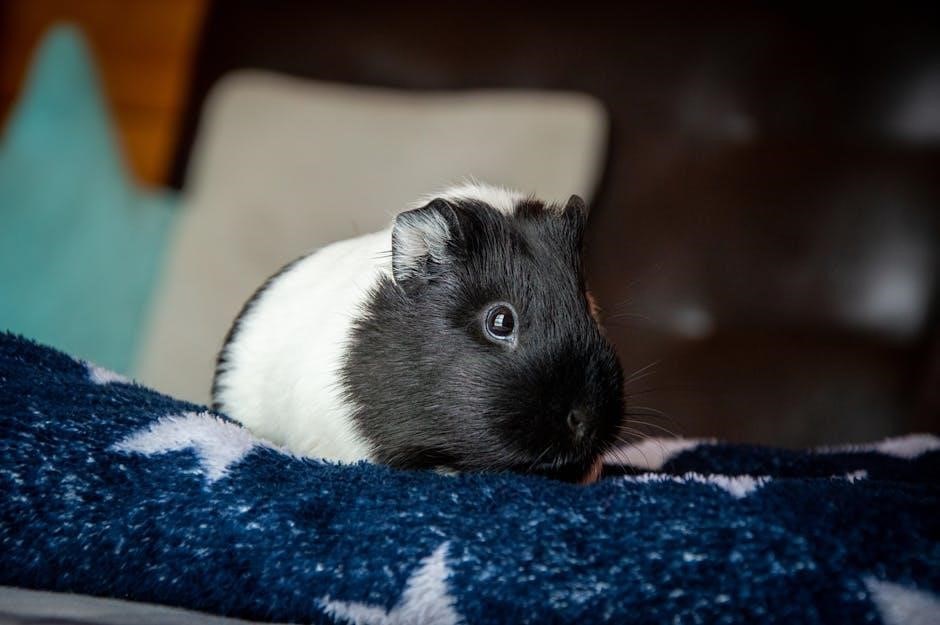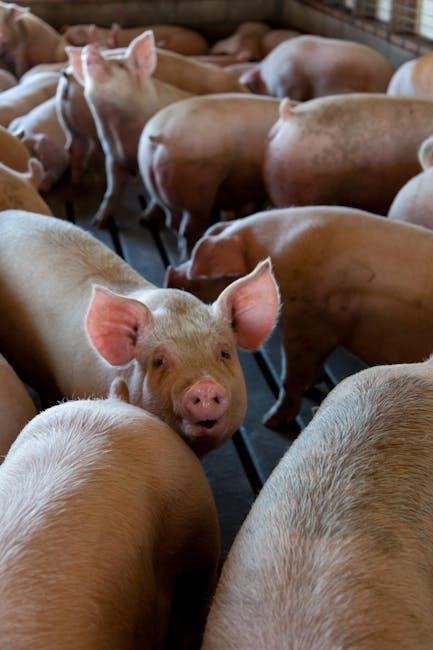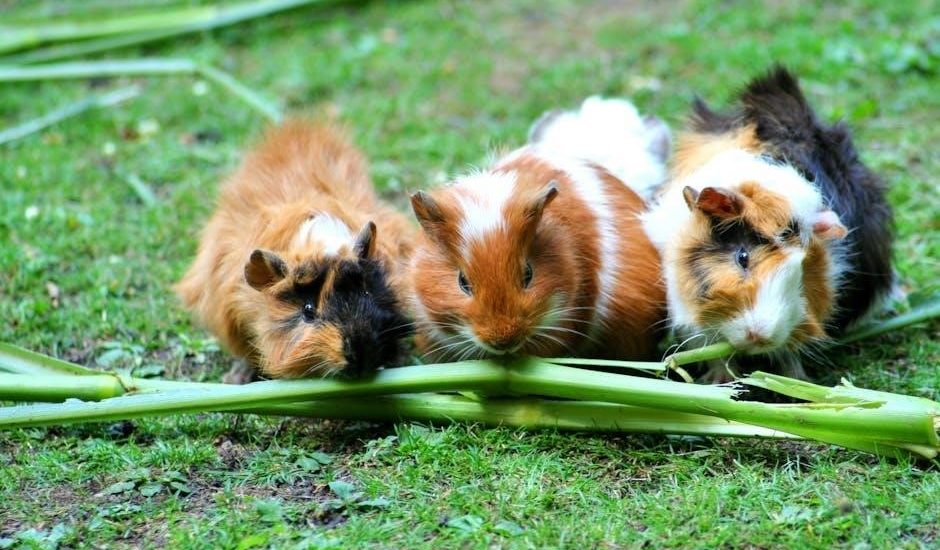Welcome to the ultimate guide on caring for guinea pigs! Understanding their unique needs‚ creating a safe environment‚ and providing a proper diet are essential for their well-being.
1.1 Understanding the Basic Needs of Guinea Pigs
Guinea pigs require ample space‚ a balanced diet rich in hay and vegetables‚ and regular social interaction. They thrive in clean‚ hygienic environments and need protection from drafts. Providing hiding places and toys stimulates their natural behavior. Avoiding harmful foods like chocolate and ensuring access to fresh water is crucial. Regular health checks and a nurturing environment are key to their well-being.
1.2 Importance of Proper Care for Guinea Pig Health
Proper care is vital for maintaining guinea pigs’ health. A nutritious diet prevents obesity and malnutrition‚ while regular cage cleaning reduces disease risks. Social interaction and mental stimulation prevent stress‚ which can lead to health issues. Proper handling and a safe environment minimize injuries. Regular vet visits ensure early detection of health problems‚ promoting longevity and quality of life for your guinea pig.
Housing and Environment
Creating a safe and comfortable environment for your guinea pig involves selecting the right cage size‚ choosing appropriate bedding‚ ensuring proper ventilation‚ and maintaining a comfortable temperature. Guinea pigs need a spacious cage with hiding places to reduce stress and prevent boredom. A solid-bottom cage is recommended to protect their feet‚ and daily cleaning is essential to keep their environment healthy. Introducing your guinea pig gradually to its new surroundings can help prevent stress‚ and ensuring the cage is secure to prevent escape attempts is crucial. Placing the cage in a quiet‚ draft-free area away from other pets will help create a peaceful habitat for your guinea pig.
2.1 Choosing the Right Cage Size and Setup
A guinea pig’s cage should be spacious‚ with a minimum size of 7.5 square feet for a single pig. A solid-bottom cage is essential to prevent foot injuries. Avoid wire flooring‚ as it can harm their feet. Line the cage with safe bedding like wood shavings or fleece. Include hiding places‚ such as boxes or tunnels‚ to reduce stress. Place the cage in a quiet‚ draft-free area to ensure a comfortable environment.
2.2 Creating a Safe and Secure Environment
Ensure guinea pigs’ safety by removing hazards like sharp objects or loose wires. Secure the cage to prevent tipping and escape attempts. Use non-toxic materials for toys and accessories. Avoid placing the cage near predators or loud noises. A secure environment fosters calmness and prevents injuries‚ ensuring your guinea pigs thrive in their home.
2.3 Cleaning and Maintaining the Cage
Regular cage cleaning is vital for guinea pigs’ health. Remove soiled bedding daily and replace it with fresh‚ safe materials. Disinfect all surfaces and accessories with pet-safe solutions. Clean food and water dishes daily to prevent bacterial growth. A clean environment reduces odors and prevents health issues‚ ensuring your guinea pigs stay happy and healthy.

Diet and Nutrition
A balanced diet is crucial for guinea pigs‚ including high-quality hay‚ fresh vegetables‚ and limited pellets. Avoid harmful foods to ensure optimal health and digestion.
3.1 Best Foods for Guinea Pigs
Guinea pigs thrive on a diet rich in high-quality hay‚ fresh vegetables‚ and limited pellets. Timothy hay is ideal‚ while leafy greens like kale and spinach are essential. Fresh veggies should be provided daily‚ avoiding high-sugar options like carrots. A small portion of guinea pig-specific pellets ensures balanced nutrition. Avoid harmful foods like chocolate and processed snacks to keep your guinea pig healthy and happy.
3.2 Importance of Hydration
Hydration is vital for guinea pigs to maintain proper bodily functions. Ensure constant access to fresh‚ clean water using a sturdy bottle or bowl. Dehydration can lead to serious health issues‚ especially in hot environments or during illness. Change water daily to prevent bacterial growth and consider offering fresh vegetables with high water content‚ like cucumbers‚ to supplement their hydration needs naturally.
3.3 Avoiding Harmful Foods
Guinea pigs require a diet free from harmful foods to stay healthy. Avoid giving them high-sugar‚ high-fat‚ or processed foods‚ as these can lead to obesity and other health issues. Certain vegetables‚ like onions and mushrooms‚ are toxic and should never be fed. Chocolate‚ avocado‚ and citrus fruits are also harmful. Stick to high-quality hay‚ balanced pellets‚ and safe‚ fresh vegetables to ensure their diet remains safe and nutritious.

Health and Wellness
Regular monitoring of your guinea pig’s health is crucial. They are prone to respiratory issues and vitamin C deficiency. Ensure a balanced diet and watch for signs of illness to maintain their well-being and prevent common health problems early.
4.1 Regular Health Checks
Regular health checks are vital for maintaining your guinea pig’s well-being. Monitor their breathing for signs of respiratory issues‚ inspect their skin for mites or infections‚ and check their eyes for discharge. Ensure their teeth are trimmed and watch for weight changes. A balanced diet rich in vegetables and hay‚ along with regular exercise‚ helps prevent common health problems and keeps them thriving.
4.2 Finding the Right Veterinarian
Finding a qualified veterinarian experienced in caring for guinea pigs is crucial. Look for an exotic pet specialist‚ as they understand guinea pigs’ unique health needs. Check reviews and ask for recommendations to ensure the vet has experience with small mammals. Availability for emergencies and a clear understanding of guinea pig-specific health issues are key. Regular check-ups can help prevent and manage common health problems early on.
4.3 Common Health Issues in Guinea Pigs
Guinea pigs are prone to specific health issues‚ including respiratory infections‚ vitamin C deficiency‚ and back injuries. Regular monitoring is vital to catch these problems early. A balanced diet rich in fresh vegetables and hay can help prevent many conditions. Additionally‚ ensuring a safe environment and avoiding falls is crucial to protect their fragile spines. Prompt veterinary care is essential for maintaining their overall health and well-being.
Grooming and Maintenance
Guinea pigs need regular grooming‚ especially long-haired breeds. Brushing prevents matting‚ while nail trimming avoids overgrowth. Both are vital for their comfort and health.
5.1 Brushing and Nail Trimming
Regular brushing is essential for guinea pigs‚ especially long-haired breeds‚ to prevent fur matting and tangling. Use a soft-bristle brush or a grooming glove daily. Nail trimming is equally important to avoid overgrowth‚ which can cause discomfort or health issues. Trim nails carefully‚ using a guinea pig-specific nail clipper‚ and reward your pet for staying calm during the process.
5.2 Special Grooming Needs for Different Breeds
Long-haired guinea pig breeds‚ like Peruvians and Silkies‚ require daily brushing to prevent matting. Use a wide-tooth comb or slicker brush gently. Crested guinea pigs need regular crest cleaning to avoid dirt buildup. Short-haired breeds‚ such as Abyssinians‚ require less frequent grooming but still benefit from occasional brushing to distribute skin oils. Each breed’s unique coat type dictates its grooming needs for optimal health and comfort.
Behavior and Socialization
Guinea pigs are social animals that thrive in groups‚ communicating through sounds and interactions. Providing companionship and a stimulating environment helps prevent stress and promotes their natural behavior.
6.1 Understanding Guinea Pig Behavior
Guinea pigs are social‚ curious creatures that exhibit natural behaviors like foraging and exploring. They communicate through vocalizations‚ such as squeaks and chirps‚ and thrive in group settings. Understanding their behavior helps in creating a stimulating environment that supports their mental and physical well-being‚ encouraging natural interactions and reducing stress. Recognizing these traits is key to providing a happy and healthy life for your guinea pig.
6.2 Encouraging Social Interaction
Guinea pigs are naturally social animals that thrive in the company of others. To encourage social interaction‚ introduce them slowly under supervision to ensure compatibility. Provide a spacious environment with hiding places and toys to reduce territorial behavior. Positive reinforcement‚ like offering treats during calm moments‚ can strengthen bonds. Regular interaction and playtime also help build trust and promote a harmonious social dynamic among your guinea pigs.

Handling and Interaction
Handling guinea pigs gently and carefully helps build trust. Start with short sessions‚ supporting their body fully to avoid injuries. Positive interaction strengthens your bond and ensures their comfort.
7.1 Safe Handling Techniques
Guinea pigs are delicate‚ so handle them gently. Move slowly‚ support their body fully‚ and lift from the front. Never pick them by the ears or legs. Daily interaction helps them trust you. Start with short sessions and avoid sudden movements. If nervous‚ scoop them up securely in a towel. Always ensure their legs are supported to prevent injuries.
7.2 Building a Bond with Your Guinea Pig
Building a bond with your guinea pig requires patience‚ consistency‚ and gentle interaction. Spend time daily‚ offering treats like fresh veggies to encourage trust. Let them approach you on their terms‚ as forced interaction can cause stress. Speak calmly and move slowly to create a safe‚ comforting environment. Over time‚ your guinea pig will grow to recognize and appreciate your presence‚ forming a strong connection.
Safety Tips
Preventing injuries is crucial for guinea pig safety. Ensure their environment is free from hazards‚ and always handle them gently to avoid accidental drops or stress.
8.1 Preventing Injuries and Accidents
Preventing injuries is essential for your guinea pig’s well-being. Ensure their environment is free from hazards‚ such as sharp objects or loose wires. Supervise interactions to avoid accidental drops‚ which can cause spinal injuries or fractures. Use a secure‚ escape-proof enclosure to prevent falls and ensure all toys are sturdy and safe. Regularly inspect their cage for potential risks and address them promptly to create a harm-free space.
- Place soft bedding like hay or fleece to cushion falls.
- Avoid sudden movements or loud noises that might scare them.
- Keep the cage away from elevated surfaces to prevent jumps.
Enrichment and Stimulation
Providing toys‚ activities‚ and a stimulating environment keeps guinea pigs mentally and physically active‚ ensuring their happiness and health through engaging play and exploration opportunities daily.
9.1 Providing Toys and Activities
Guinea pigs thrive on mental and physical stimulation. Offer toys like tunnels‚ chew toys‚ and interactive games to keep them engaged. Rotate toys regularly to prevent boredom and encourage exploration. Incorporate natural elements such as untreated wood and hay for chewing. Providing a variety of activities ensures your guinea pig remains happy‚ active‚ and mentally stimulated‚ promoting overall well-being and a fulfilling life.

Signs of Stress and Solutions
Guinea pigs may show stress through pacing‚ hiding‚ or changes in appetite. Ensure a calm environment‚ provide hiding places‚ and address underlying issues promptly to reduce anxiety.
10.1 Recognizing Signs of Stress
Guinea pigs exhibit stress through behaviors like pacing‚ excessive hiding‚ or changes in appetite. They may also display labored breathing‚ trembling‚ or unusual vocalizations. Watch for signs such as hair loss‚ lack of interest in activities‚ or avoidance of social interaction. Recognizing these indicators early allows you to address potential issues before they escalate‚ ensuring your guinea pig’s well-being and happiness.
10.2 Reducing Stress in Guinea Pigs
To reduce stress in guinea pigs‚ ensure their environment is calm and predictable. Provide plenty of hiding places‚ a spacious cage‚ and soft bedding. Maintain a stable temperature and minimize loud noises. Offer a balanced diet‚ fresh water‚ and enrichment toys to keep them mentally stimulated. Social interaction is crucial‚ so house them with compatible companions. Handling gently and avoiding sudden movements can also help alleviate stress.
Breeding and Caring for Babies
Breeding guinea pigs requires careful planning and attention. Ensure a safe‚ nutritious environment for newborns‚ monitor their health‚ and provide proper care to support their growth and well-being.
11.1 Caring for Newborn Guinea Pigs
Caring for newborn guinea pigs requires attention to their environment‚ diet‚ and health. Ensure they stay warm in a safe‚ clean space with their mother. Provide fresh hay‚ limited pellets‚ and water in a shallow dish. Monitor their health daily‚ watching for signs of distress. Handle them gently and briefly at first to aid socialization. Regular vet check-ups are crucial for their well-being.
By following this guide‚ you’ll master the basics of guinea pig care. Ensure proper housing‚ diet‚ and health checks to provide a happy‚ healthy life for your pet.
12.1 Summary of Key Care Tips
Provide a safe‚ spacious cage with proper bedding and hideaways. Offer a balanced diet rich in hay‚ fresh veggies‚ and limited pellets. Ensure daily interaction and mental stimulation through toys. Regular health checks and a trusted exotic vet are crucial. Handle gently and patiently to build trust. Keep them hydrated and avoid harmful foods. Show love and attention to ensure a happy‚ healthy guinea pig.





